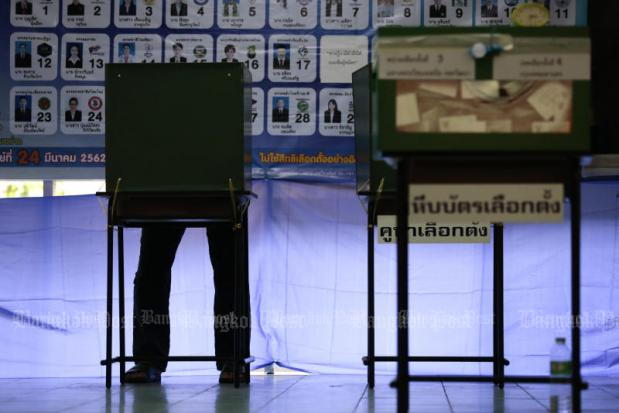Unity govt 'same as a dictatorship,' parties say
published : 16 Apr 2019 at 09:48
writer: Gregory Morrissey
ORIGINAL SOURCE/WRITER: Post Reporters

Political parties have poured cold water on the idea of setting up a national unity government as a way out of a potential deadlock following the March 24 election.
Political observers note Thai politics may be moving toward an impasse as two major parties, the pro-regime Palang Pracharath Party (PPRP) and the Pheu Thai Party, compete fiercely to form a coalition government.
The PPRP, with the support of 250 appointed senators under its wing, is believed to have an advantage over its rival. The senators will play a crucial role in the parliamentary vote to select a prime minister, potentially returning incumbent Prime Minister Prayut Chan-o-cha back to Government House.
However, without a decisive majority, a coalition government formed under the PPRP would struggle to function. With a marginal majority, such an alliance would be short-lived.
Pheu Thai may prove successful in gathering seats to form a coalition, but the number of MPs in its camp would not substantially outnumber that of its rival. As a result, a Pheu Thai coalition would likely face the same fate.
Given this outlook, the idea of a national government has been floated by some politicians.
This refers to a government made up of all parties that won MP seats in the latest poll. That would leave no opposition in parliament, effectively creating a vacuum where a system of checks and balances should be.
Future Forward Party (FFP) spokeswoman Pannika Wanich on Monday confirmed the party's opposition to a national unity government, claiming it would be in breach of the constitution which stipulates there must be an opposition.
She described checks and balances as a key part of any truly democratic system.
If all parties were to join forces and form one government with no countering force to scrutinise them, it would be tantamount to a dictatorship, she said.
"Voters have high expectations of this election and no one would want the next government to be the same as the NCPO [the National Council for Peace and Order]," she said.
"There are many ways to break the deadlock, so a national government is not needed. One way would be trying to gather the support of other parties to achieve a majority [of at least 251 MPs]."
Somsak Thepsuthin, head of the PPRP's election campaign panel, said he did not expect to see a lasting political deadlock.
"Eventually the parties will adjust to the circumstances and come together to work for the country. No one wants to return to conflict [and street protests]," Mr Somsak said.
Thepthai Senpong, a Democrat candidate who won in Nakhon Si Thammarat's Constituency 3, was among those who floated the idea of a national unity government.
He said this was merely his opinion and did not reflect the party's stance.
He said the idea was not intended to benefit the Democrat Party, which suffered an embarrassing defeat in the March 24 election, losing all its seats in Bangkok as well as several in the South and lower North, its traditional strongholds.
"A national government would benefit all parties. It could also amend the charter," Mr Thepthai said. Many consider the constitution to be the main cause of the current deadlock.
Meanwhile, a new poll showed that 76.5% of respondents agreed parties would not benefit from fielding the same old faces for prime minister or a non-elected outsider prime minister.
Vocabulary
- amend: to make changes to a document, law, agreement, etc. especially in order to improve it - การแก้ไขกฎหมาย
- breach (noun): a failure to follow a law or rule - การละเมิดกฎหมาย, การละเมิดกฎข้อบังคับ
- checks and balances: a system that limits power within a political system, group, or organization in which no single part of it can become too powerful, because it needs the agreement of the other parts for its actions to be legal -
- counter: to go against - ต้าน, แย้ง
- deadlock: a situation in which neither person or group involved in a disagreement is willing to change their opinions or positions - หมดหนทาง ไม่มีทางแก้
- fiercely: very strongly - อย่างรุนแรง, อย่างดุเดือด
- float: to suggest a plan or an idea for consideration - เสนอ
- impasse: a situation in which progress is not possible because none of the people involved are willing to change their decision - ทางตัน
- pour cold water: to give reasons for not being in favour of something; to criticise something -
- regime: a government that controls a country, especially in a strict or unfair way - รัฐบาลที่ขึ้นมาปกครองโดยการยึดอำนาจ
- rival: a person, group, team or business that competes with another - คู่ต่อสู้, คู่ปรับ, คู่แข่ง
- scrutinise: to look at or examine somebody/something carefully - พินิจพิเคราะห์, พิจารณา, ตรวจสอบ
- stance: an attitude or view about an issue that you state clearly; position - จุดยืน
- stipulate: to state exactly how something must be or must be done - ระบุ, ระบุเงื่อนไข
- stronghold: bastion; an area where there is a lot of support for a political party - ฐานเสียง, ฐานที่มั่น, ขุมกำลัง
- struggle (verb): to try hard to do something that you find very difficult - พยายาม; ต่อสู้
- tantamount to: tantamount to being almost the same or having the same effect as, usually something bad - เท่ากัน
- vacuum: emptiness; not having anything inside; not having air inside - สุญญากาศ, บริเวณที่ไม่มีอากาศ




